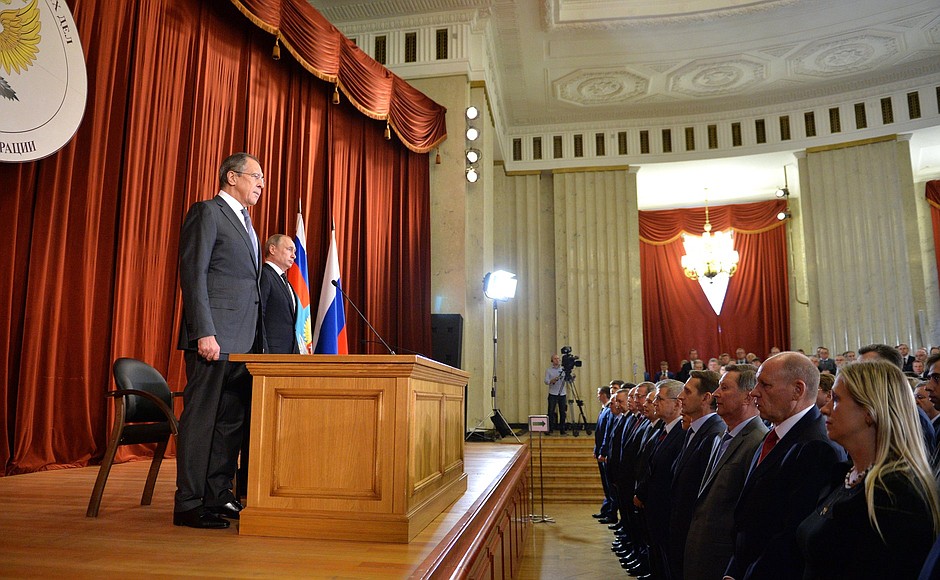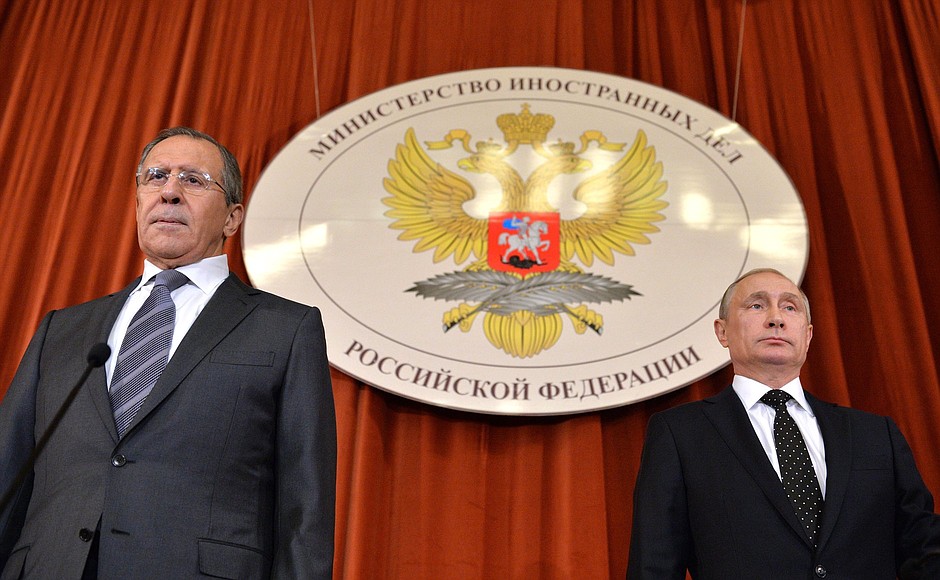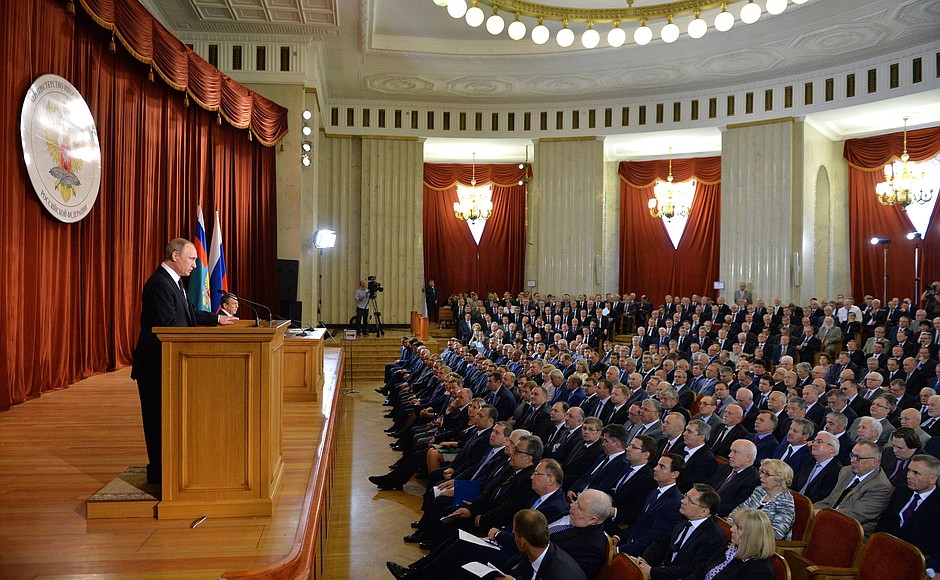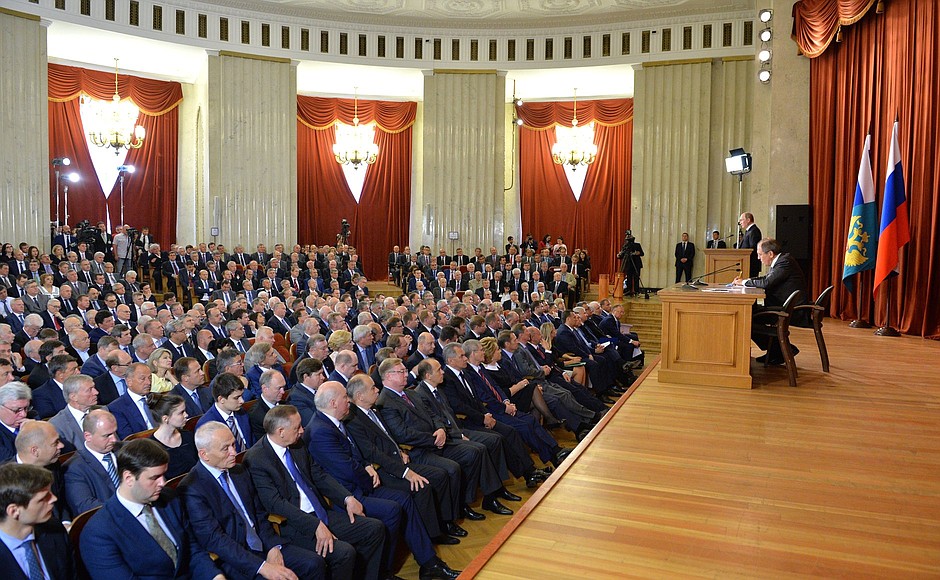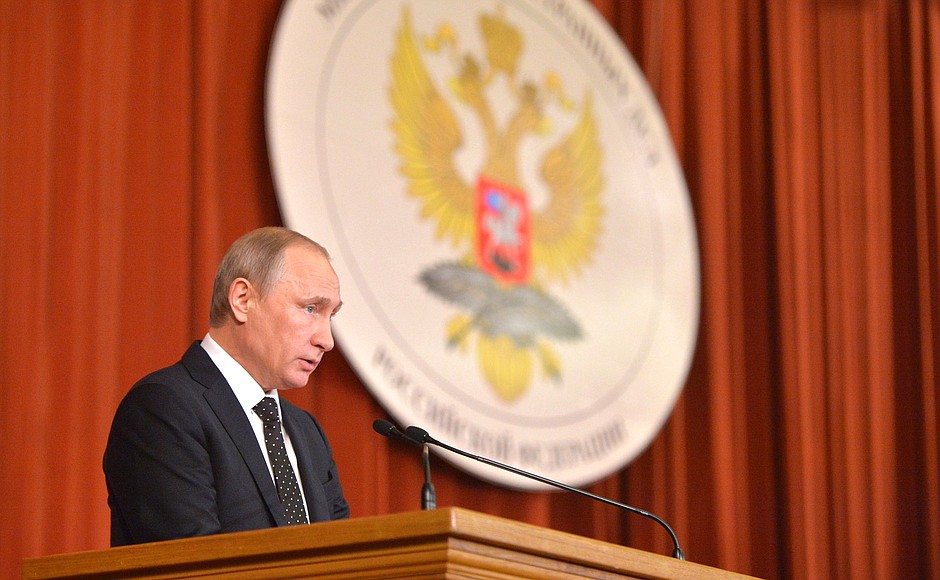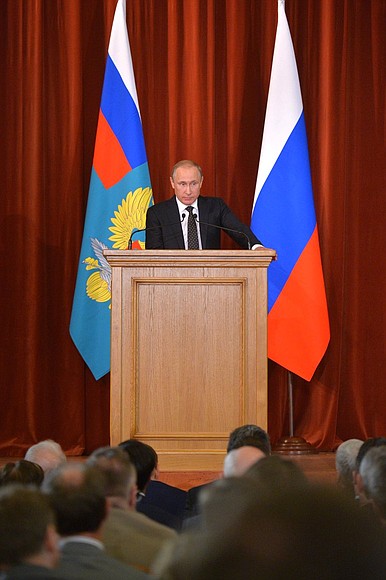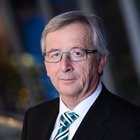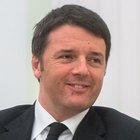President of Russia Vladimir Putin: Colleagues, it is a pleasure to greet you all at this traditional gathering at the Foreign Ministry. Let me start by thanking the Foreign Ministry’s heads and staff and everyone working in our missions abroad for their professionalism and devotion to their work. I am sure that you will all continue to work in the same well-coordinated and effective fashion.
Russia follows an independent foreign policy and seeks to develop open and honest relations with all countries, in the west, east, south and north. Russia seeks mutually advantageous and constructive ties in the broadest range of areas. We do not impose our will or our values on others and we fully comply with the provisions of international law and consistently uphold the key role of the United Nations and its Security Council in resolving global and regional problems.
As you know, the world today is far from stable and the situation is becoming less predictable all the time. Great change is taking place in all areas of international relations. Competition for influence and resources is increasing. At the same time, we see confrontation between different visions of how to build the global governance mechanisms in the 21st century, and attempts by some to throw aside all rules and conventions in general.
All of this makes it harder to organise effective multilateral efforts to resolve crises and helps to create new hotbeds of tension. The potential for conflict continues to grow. Security, economic and humanitarian risks are not lessening, but are growing, multiplying, and spreading further around the world.
It is my conviction that it is only through dialogue and joint work that we can avoid dangerous breakdowns and uncontrolled developments. The international community must make progress in establishing a fairer world order built on the principles of common and indivisible security and collective responsibility.
Today’s world is clearly more interdependent, and the problems our countries face are in large part common challenges. There is no need to prove what is self-evident now. I therefore say again that cooperation, a common will, and willingness to seek compromises are the key to resolving the greatest and most complex problems, no matter where in the world they arise.
However, we see how some of our partners continue stubborn attempts to retain their monopoly on geopolitical domination. They put to use centuries of experience in suppressing, weakening, and setting opponents against each other, and turn to their advantage enhanced political, economic, financial and now information levers as well.
By this, I mean, for example, the practice of intervening in other countries’ internal affairs, provoking regional conflicts, exporting so-called ‘colour revolutions’ and so on. In pursuing this policy, they sometimes take on as accomplices terrorists, fundamentalists, ultra-right nationalists, and even outright neo-fascists.
We see direct evidence of the harm this policy causes right on our borders. Two years ago, the list of regional hotspots got the addition of Ukraine, much to our regret, where the flames of internal conflict were fanned at the cost of human lives, destruction of economic ties, and streams of refugees, including into Russia.
We genuinely want to see the Ukrainian crisis resolved as swiftly as possible and we will continue working on this with the other Normandy Format participants and with the United States. We want to see a Ukraine that is a good neighbour and a predictable and civilised partner living in peace at home and in the world. But for this to happen, the authorities in Kiev must finally wake up to the need for direct dialogue with Donbass, with Donetsk and Lugansk, and the need to carry out in full their obligations under the Minsk agreements.
It is unacceptable to prolong the Ukrainian crisis and unacceptable to blame others for this, particularly Russia. This only worsens the already unhealthy situation on the European continent and aggravates the consequences of the great mistake that was NATO’s decision to expand eastwards rather than to start building, with Russia as a full-fledged partner, a new architecture for equal and indivisible security from the Atlantic to the Pacific.
Today, NATO seems to be making a show of its anti-Russian stance. NATO not only seeks to find in Russia’s actions pretexts to affirm its own legitimacy and the need for its existence, but is also taking genuinely confrontational steps. The mythical Iranian nuclear threat has gone now. As I said publicly on many occasions, it was the Iranian nuclear threat that was used to justify the need for a missile defence system, but we see that work to build this system’s infrastructure in Eastern Europe continues. Back when these plans were taking shape, we said that this was a deception, a fetish, a mere pretext. And this is exactly what it was. The number of military exercises has increased dramatically, including in the Black Sea and the Baltic Sea. We are constantly accused of military activity, but where? Only on our own soil. We are supposed to accept as normal the military build-up on our borders. Rapid reaction forces are being deployed in Poland and the Baltic countries, and there is a build-up in offensive weapons. All of this seeks to undermine the military parity achieved over a period of decades.
Let me say that we keep constant watch over all that is happening. We know what constitutes an adequate response in this situation and we most certainly will respond if needed in the future. However, we are not going to let ourselves get intoxicated by these military passions. It seems that others are trying to nudge us this way, provoke us into a costly and futile arms race so that we divert resources and effort from our great socioeconomic development tasks at home. We will not do this, but we will always ensure our reliable defence and will guarantee the security of our country and its citizens.
The military intervention in Iraq and Libya are the most vivid examples of this irresponsible and mistaken policy that has led to a rise in terrorism and extremism. It is clear to everyone today that this policy has contributed to the emergence of menacing organisations such as the Islamic State (DAISH). Terrorists have tried to turn to their advantage, and not without success, the breakdown in state systems and the results of, frankly speaking, clumsy experiments in exporting democracy to parts of the Middle East and North Africa. Every man and his dog talks about this now. It would be funny if it were not so sad, and if it were not the cause of so many tragedies.
The terrorist threat has greatly increased and is now challenging global security. True, terrorists do not as yet possess all the modern military weapons systems and equipment, but they have already made grabs for chemical weapons. Their actions are spreading far beyond the bounds of just one region and it is difficult to predict where to expect new serious attacks.
Syria has found itself at the epicentre of the fight against terrorism. It is no exaggeration to say that Syria’s future will be decisive not only for the future of the Middle East. It is in Syria that the fight against terrorism is being decided, the fight against this same Islamic State that has gathered terrorists and extremists of all stripes under its banners and united them in a desire to expand throughout the entire Muslim world.
We know that they have set the goal of gaining strongholds in Libya, Yemen, Afghanistan, the countries of Central Asia, the regions along our borders. This is why we responded last autumn to the Syrian government’s request for help in fighting this terrorist attack. I would .like to thank once again our military service personnel, who did all they could to push back the terrorists, prevent an illegitimate external armed intervention in Syria’s affairs, and preserve Syrian statehood. Russia’s diplomacy played a positive role here too.
At the same time, acting together with the United States and other partners, we succeeded in putting in place a ceasefire in parts of Syria. This further reaffirms what I said before about the fact that we can resolve today’s most serious issues only if we work together.
We have launched an internal Syrian negotiating process. Certainly, we know that we are still a very long way from reaching a final settlement, but the experience we have gained over these past months in Syria shows very clearly that, as I said, only through common efforts and working towards the broad anti-terrorist front that Russia has consistently called for can we successfully counter today’s threats, combat terrorism and resolve the other challenges humanity faces today.
This was also the nature of the discussions at the 15th anniversary Shanghai Cooperation Organisation summit last week in Tashkent, where we looked at common measures to ensure security in Central Asia, agreed to intensify our political, economic, cultural, humanitarian and information contacts, and put the organisation’s enlargement on a practical footing with India and Pakistan’s accession. This really was a significant political step. I would also like to say that this was possible only through the unprecedented level of cooperation and trust in the relationship between Russia and the People’s Republic of China.
I would also like to mention the situation with our southern neighbour, Turkey. Yesterday, as you know, I spoke with the Turkish President. You may also know that Ankara has apologised for the Russian fighter plane that was shot down. In this situation, we plan to start taking measures very soon to restore our bilateral cooperation.
One of our priorities is most certainly to bolster the strategic partnership in the Eurasian region. Together with Belarus, Kazakhstan, Armenia and Kyrgyzstan, we are carrying out the big integration project that is the Eurasian Economic Union, EAEU, as we call it for short.
Within this union, we are not only removing all barriers to trade and investment movement, but are also creating a common socioeconomic space based on WTO principles, with a common policy in many economic sectors and common standards. We are developing industrial and technological cooperation and are carrying out joint research and educational programmes.
The Eurasian Economic Union seeks cooperation with other countries and integration organisations on the basis of freedom and openness and respect for the universally accepted rules of global trade, of course. The EAEU is in consultations with more than 40 countries and international organisations on establishing free trade zones. We have already signed a free trade agreement with Vietnam, are negotiating with Israel and Serbia, and will soon start looking at an agreement with Egypt.
During my visit to China last week, we launched negotiations on establishing a comprehensive trade and economic partnership in Eurasia based on the Eurasian Economic Union and the Chinese Silk Road Economic Belt project. We see this as the first step towards creating a broad Eurasian partnership that would involve the EAEU members, other CIS states, China, India, Pakistan, and in the future also Iran. Let me add that this idea also received the support of Southeast Asian leaders at the Russia-ASEAN summit in Sochi in May.
I discussed the development of close and respectful cooperation between the EAEU and the European Union during the St Petersburg International Economic Forum with European Commission President, Mr Juncker and the Italian Prime Minister, Mr Renzi.
The Europeans are not having an easy time right now, of course. We see what is happening and understand the situation. The result of Britain’s referendum on leaving the EU has rattled the markets, but I think that everything will come right again over the medium term.
What I would like to stress in this respect is that ‘Brexit’ is the choice Britain’s people have made and we have not and will not interfere in this process. However, we will follow these developments closely of course, follow the talks between London and Brussels and the potential consequences for Europe and for all of us. It is clear that this referendum’s traumatic effect will make itself felt for a long time yet. We will see how they all put democratic principles into practice.
Let me also stress that not only has Russia not abandoned the idea of establishing a common economic and humanitarian space from the Atlantic to the Pacific together with the European Union, but we also think this would be the most promising policy in terms of guaranteeing the entire Eurasian continent’s long-term sustainable development.
As for the United States, as we know, the presidential election campaign is now in its final stage. Naturally, we will respect the American voters’ choice and are ready to work with whoever becomes the next president.
Moreover, what we want is to work in close cooperation with the United States on international affairs, but we will not accept the approach of that part of the U.S. establishment that thinks they can decide themselves in which areas we will cooperate and in which areas they will turn up the pressure, including through sanctions. We seek a partnership based on equality and consideration of each other’s interests. Only on this basis can we work together.
Summing up, I would like to say that the diversity and complexity of the international problems, threats and challenges that Russia faces today require constant enhancement of our array of diplomatic tools in the political, economic, humanitarian and information spheres.
Work is nearing completion now on drafting Russia’s new foreign policy concept document, which sets the direction of active work to promote international peace and stability and uphold a fair and democratic world order based on the United Nations Charter.
Russian diplomacy should take a more active part in helping to settle current conflicts and prevent the emergence of new hotbeds of tension and conflict, especially along our borders, of course, strengthen sovereignty and territorial integrity, and protect our country’s interests.
It is important to create an atmosphere of cooperation and good-neighbourly relations with other countries and put in place good external conditions for raising our citizens’ prosperity and ensuring Russia’s dynamic development as a rule of law, democratic state with a socially-oriented market economy.
To do this, we must achieve greater results from our work in the economic direction, our economic diplomacy, and offer practical help to our companies to promote new Russian goods and products abroad, take their high-tech developments to the regional and global markets, and draw on the best foreign inventions and technologies, and management models and methods.
Our diplomats understand, of course, how important the battle to influence public opinion and shape the public mood is these days. We have given these issues much attention over recent years. However, today, as we face a growing barrage of information attacks unleashed against Russia by some of our so-called partners, we need to make even greater efforts in this direction.
We are living in an information age, and the old saying that whoever controls information controls the world unquestionably sums up today’s reality. Sometimes, you get the impression that an event has not taken place at all unless the media reports on it. [Former French President] Jacques Chirac said to me once, “You must get the cameras in, otherwise it will look as though we never actually met”. This is how things happen in practice.
We must put up strong resistance to the Western media’s information monopoly, including by using all available methods to support Russian media outlets operating abroad. Of course, we must also act to counter lies about Russia and not allow falsifications of history.
Colleagues, I would also like to say a few words about the decisions we have taken to further bolster the potential of Russia’s foreign policy service and create conditions for our diplomats to work with greater result.
Our last meeting in 2014 coincided with the presidential executive order on enhancing the wage payment system for diplomats, which substantially increased their material support, including their pension provisions.
I recently signed a law on plenipotentiary and extraordinary ambassadors abroad and permanent envoys to international organisations. This law sets out the status of Russia’s ambassadors, defines their powers, and provides for additional social guarantees.
We have also adopted a resolution on diplomatic service veterans who retired before 1996. This resolution increases the additional monthly payments to their old-age pension. I know that the Foreign Ministry’s heads have presented a proposal to improve the healthcare system for diplomatic service personnel by establishing a specialised rehabilitation centre. I support this idea and I asked the Government to draft the relevant proposals for ensuring financing from the federal budget.
The authorities will continue to consider carefully your proposals for bolstering the diplomatic service’s material and human resource base and ensuring social guarantees for diplomatic personnel and their families. I conclude the first part of my remarks here. I thank our colleagues from the media. We will now say a few words behind closed doors.
<…>
